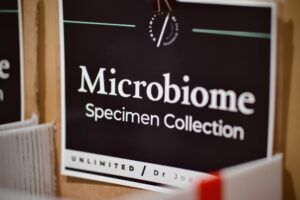An Update from the Research Team – May 2023
Do words matter?
If you’ve been a subject in any of our recent studies, or you’ve seen one of our research presentations at an event, then you probably heard about FLIP. We are using the FLIP app to record a daily “video diary” of the research subjects’ experiences during the week-long events. The roughly 6-7 recordings from thousands of subjects serve as a unique record of the evolution of the human experience. Many describe these events as transformative, and our research aims to quantify transformation using this library as a unique way to inform and evolve the meditative practice.
The video recordings contain three elements we are using in our analysis: words, video/images, and sound.
WORDS: In many ways, words expressed can reveal an immense amount of information about how we feel, think, behave, create, heal, thrive, and grow as humans. Words can be transcribed and analyzed for unique patterns. Your outward expression is your language and the words you use, which then informs how you engage with those around you positively and negatively. We are working with Jeff King, EdD, from the University of Central Oklahoma, who has spent a career assessing the use of transformative language in the academic setting. Dr. King uses unbiased tools to assess language usage, and we will utilize his expertise in our studies.
VIDEO/Images: We are also collaborating with experts to assess the video files for changes in facial features (i.e., muscle tone, eye tracking, head movement) and how these evolve over the week.
SOUND: The final piece will be the sound files to assess changes in tone and voice. We will work with musicians to pick out these various patterns in the sound files.
Combining these three elements recorded over the week-long in a multitude of individuals has the potential to lead to profound insights into how the mind impacts the body.
In addition to this three-component analysis, we are coupling two additional measures to ascribe biological meaning to the changes we expect to observe in the above analysis: microbiome and surveys.
MICROBIOME: As we have expanded our microbiome studies, it has become apparent that the gut is a major regulator of your biology, and some studies suggest that the bacteria that live in your gut can regulate your health. Studies in infants have shown how gut microbiome can regulate language and cognitive development.1,2
SURVEYS: In addition to this, we collect self-reported health surveys throughout the process. These surveys help us understand how you describe your current mental, emotional, and physical health.
No impactful studies have been conducted with adults to connect biological features to words, video/images, or sound to self-reported changes in health.
We expect to trailblaze in this space by coupling these informative social, biological, and biometric data with a transformative experience. All this information will go into a machine learning/AI platform that will allow us to see common features that may give us access to learning and create positive change.
 So how do we achieve this?
So how do we achieve this?
We designed the DOWN UNDER (Deep micrObiome With laNguage Use aNalysis to Determine hEalth Resilience) Study as a starting point. As the world opens, so do opportunities. All our data collection to date has been in the US. Australia represented an opportunity to capture a broader sample set, and there was immense interest in the study resulting in sample collection from nearly 400 individuals. As I was interacting with subjects and colleagues there, it dawned on me that the opportunity was much bigger than we could have imagined. In under 6 months, there would be week-long events in Australia, the United States (Nashville/Denver), Central America (Cancun), and Europe (Vienna). The ability to sample a global population to assess the genetic and cultural aspects of the above research was unprecedented. DOWN UNDER evolved into the GLOBAL (Gut and Language multi-cOntinent Based Analysis to change Life) Study. With the recent completion of the Nashville event, we have added another 250 individuals and hope to be around 1200 subjects globally by the time of the Vienna event.
So what does this mean?
There are research groups worldwide that are using machine learning and AI coupled with natural language processing to probe medical charts, assess how people speak, and other features to predict health, disease, and treatment better. Our vision is similar but applies more depth and information to uncovering these metrics. Can we use “expensive” (i.e., time and cost) data to inform “inexpensive” data (i.e., easy to capture and analyze in a cost-effective manner) to guide the experience? Our goal is to help individuals get “bio” feedback about their meditative and life experiences by developing algorithms that combine expensive biological data with inexpensive video capture data. Once this validates with the 1000+ samples we expect, the process can continue with collecting and analyzing only the inexpensive data to inform individuals. An even more futuristic vision…with the inclusion of genetic, cultural, and distinct locations with inclusion of healthy and non-healthy subjects to capture unique variables, can we ultimately use just the video capture as a “biomarker biopsy” to diagnose, intervene, treat, and cure what ails us?
The Catalyst community has immensely supported our research, and we are so grateful in many ways. I look forward to keeping you posted on what this amazing study will reveal.

